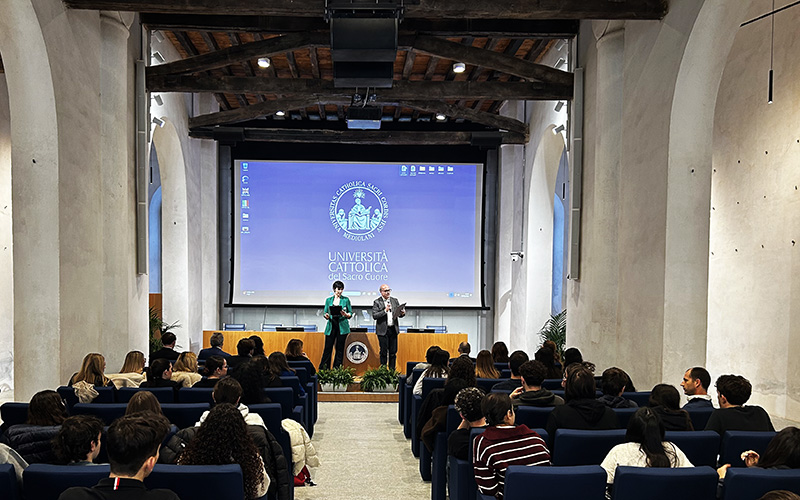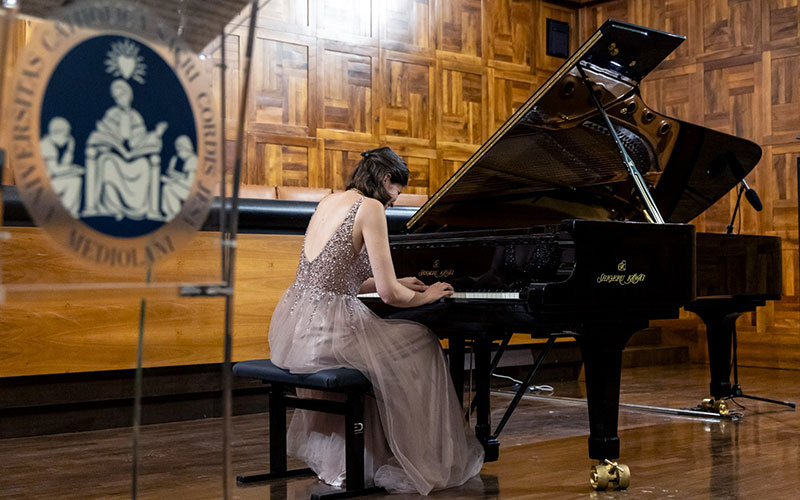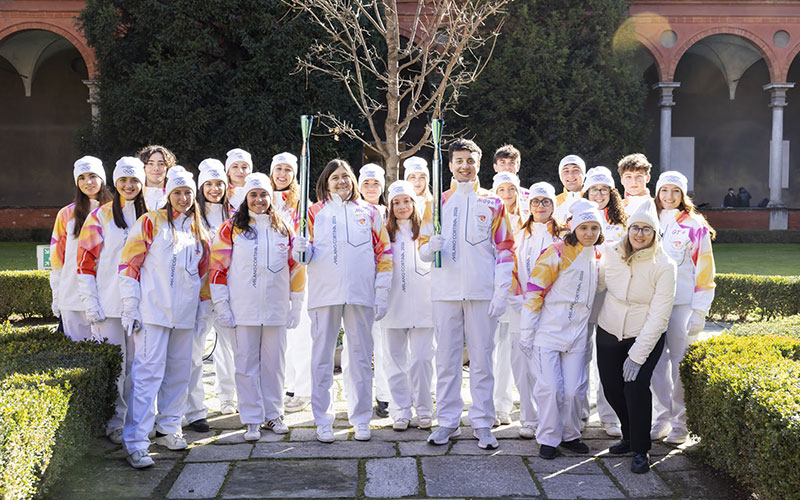 Prolungamento delle iscrizioni a.a. 25/26
Spazio Unicatt - Prolungamento delle iscrizioni
Prolungamento delle iscrizioni ai corsi di laurea triennali e magistrali a ciclo unico 25/26 fino al 6 marzo 2026, con riconoscimento crediti semestre aperto di Medicina
Prolungamento delle iscrizioni a.a. 25/26
Spazio Unicatt - Prolungamento delle iscrizioni
Prolungamento delle iscrizioni ai corsi di laurea triennali e magistrali a ciclo unico 25/26 fino al 6 marzo 2026, con riconoscimento crediti semestre aperto di Medicina
Corsi di laurea
Post laurea
Scegli il tuo percorso
Eventi
131 elementi trovati
-
Seminario Semplificare per competere
Milano - 02 marzo 2026 -
Stage & Placement Challenges of Generative AI in organizational contexts: reflections from the case of Oracle
Piacenza Campus - 02 marzo 2026 -
Mostra L’alchimia del sentimento
Piacenza - 02 marzo 2026 -
Seminario di studio Studi e ricerche sui beni archeologici in Università Cattolica
Milano - 02 marzo 2026 -
Presentazione volume Giovanni Bazoli Vita Eterna
Brescia - 02 marzo 2026 -
Lezione aperta Parole in azione
Brescia - 02 marzo 2026 -
Seminario internazionale Echi della crisi in Libano
Milano - 02 marzo 2026 -
Stage & Placement Yome: come abbiamo trasformato una passione in una startup
Piacenza Campus - 02 marzo 2026 -
Seminario di studio Le politiche nazionali per le Aree interne: competitività e coesione
Piacenza - 03 marzo 2026 -
Ciclo di seminari WWIT: WORLD WAR INTERNATIONAL TALKS
Milano - 03 marzo 2026 -
Presentazione volume La melanconia dell'aragosta
Brescia - 03 marzo 2026 -
Dibattito Verso il Referendum Costituzionale: le ragioni del sì e del no
Cremona - 03 marzo 2026 -
Stage & Placement La gestione delle relazioni in un gruppo multinazionale: il caso VHIT
Cremona Campus - 03 marzo 2026 -
Stage & Placement Recruiting Day Marsh Risk
Milano - 04 marzo 2026 -
Stage & Placement Company Visit Accenture
Milano - 04 marzo 2026 -
Seminario Libertà ed ermeneutica del desiderio
Brescia - 04 marzo 2026 -
Stage & Placement Company Visit - Meet BDO
Milano - 04 marzo 2026 -
Lezione aperta Transizioni, pratiche formative. Disegnare nuove mappe di speranza
Brescia - 04 marzo 2026 -
Stage & Placement LINKEDiN LAB | Crea e pubblica il profilo perfetto
Campus di Piacenza - 04 marzo 2026 -
Convegno Incontri sulla metafisica
Milano - 04 marzo 2026 -
Presentazione volume Il discorso del rabbino
Milano - 04 marzo 2026 -
Presentazione volume CSR and its Internal Narrative
Milano - 04 marzo 2026 -
Cerimonia Cerimonia "White Coat" Medicina e chirurgia 2026
Roma - 04 marzo 2026 -
Stage & Placement Aggregazione strategica e valore pubblico: il caso dell’Unione Bassa Romagna
Piacenza Campus - 04 marzo 2026 -
Seminario Storicismo giuridico?
Milano - 04 marzo 2026 -
Ciclo di incontri Nuovi equilibri e (dis)ordine internazionale in un mondo che cambia
Cremona - 05 marzo 2026 -
Conferenza Don Chisciotte
Brescia - 05 marzo 2026 -
Stage & Placement Recruiting Day Intesa Sanpaolo
Milano - 05 marzo 2026 -
Il Pianoforte in Ateneo Il Pianoforte in Ateneo
Milano - 05 marzo 2026 -
Seminario La Riforma Costituzionale della Magistratura: un dialogo con i protagonisti del processo
Piacenza - 05 marzo 2026 -
Webinar online Female teachers' education
Milano - 05 marzo 2026 -
Lezione aperta The duality of human nature in 19th-century literature: Robert Louis Stevenson's the strange case of dr. Jekyll and mr. Hyde
Brescia - 05 marzo 2026 -
Lezione aperta Cinema e guerra
Brescia - 05 marzo 2026 -
Lezione aperta Un confronto tra teorie del diritto
Milano - 05 marzo 2026 -
Presentazione volume Nata contro
Brescia - 05 marzo 2026 -
Ciclo di seminari Testi in dialogo - Riscritture letterarie
Milano - 06 marzo 2026 -
Stage & Placement - Facoltà di Economia Dialogando con Luca Bocca - Chief Financial Officer di INTESA SANPAOLO
Milano - 06 marzo 2026 -
Seminario Il bibliotecario attuale. Un professionista fra tradizione e futuro
Brescia - 06 marzo 2026 -
Convegno Politiche di welfare e amministrazione condivisa tra istituzioni e comunità
Milano - 06 marzo 2026 -
Seminario Sguardi interculturali per una scuola che accoglie
Brescia - 06 marzo 2026 -
Gara a squadre di matematica Disfida matematica 2026
Brescia - 06 marzo 2026 -
Seminario Thermae in radicibus Alpium
Milano - 06 marzo 2026 -
Incontro di studi La legge costituzionale sulle «norme in materia di ordinamento giurisdizionale e di istituzione della corte disciplinare»
Milano - 06 marzo 2026 -
Cattolicaper lo Sport I ragazzi del dottor Brolis
Milano - 09 marzo 2026 -
Lezione aperta Sulle tracce del 'Colombre'
Milano - 09 marzo 2026 -
Seminario Intelligenza artificiale, diritto e legal prompting
Piacenza - 10 marzo 2026 -
Stage&Placement Career Insights
Milano - 10 marzo 2026 -
Seminario Educare con cervello
Piacenza - 10 marzo 2026 -
Stage & Placement Recruiting Day Generali
Milano - 10 marzo 2026 -
Ciclo di seminari WWIT: WORLD WAR INTERNATIONAL TALKS
Milano - 10 marzo 2026 -
Stage & Placement Human in the Loop: Thinking with AI Without Stopping Thinking
Piacenza Campus - 10 marzo 2026 -
STAGE&PLACEMENT Job Target - Lavoropiù Spa
Milano - 10 marzo 2026 -
Incontro di studi Governare le fragilità
Milano - 10 marzo 2026 -
Incontri (Ri)Lettura dei Promessi Sposi
Milano - 11 marzo 2026 -
Stage & Placement Company Visit Unicredit
Milano - 11 marzo 2026 -
Seminario di studio Le politiche territoriali per le Aree interne
Piacenza - 11 marzo 2026 -
Stage & Placement Company Visit Prelios
Milano - 11 marzo 2026 -
Stage & Placement LINKEDiN LAB | Crea e pubblica il profilo perfetto
Campus di Cremona - 11 marzo 2026 -
Lezione aperta Cinema e guerra
Brescia - 11 marzo 2026 -
Ciclo di incontri Economia, produttività e sfide tecnologiche. Dove stanno andando l’Europa e l’Italia?
Cremona - 12 marzo 2026 -
Conferenza Amleto
Brescia - 12 marzo 2026 -
Testimonianze Professione Traduttore
Brescia - 12 marzo 2026 -
STAGE&PLACEMENT Cv Point – Gi Group
Milano - 12 marzo 2026 -
Stage & Placement Visita aziendale e Dinner Meeting con…
Piacenza Campus - 12 marzo 2026 -
Dibattito Riforma della Magistratura: verso il referendum costituzionale
Piacenza - 12 marzo 2026 -
Stage & Placement INTERVIEW LAB | Preparati seguendo le principali linee guida e simula un colloquio individuale con il recruiter
Campus di Piacenza - 13 marzo 2026 -
Lezione aperta Neuropotenziamento per le organizzazioni, lo sport e la clinica
Milano - 13 marzo 2026 -
Ciclo di lezioni Linguistica storica e filologia (5 edizione)
Milano - 16 marzo 2026 -
Stage & Placement Recruiting Day Sorgenia
Milano - 16 marzo 2026 -
Stage&Placement CV Game & Lab con Lidl
Milano - 16 marzo 2026 -
Lezione aperta Didaktik der deutschen Literatur an italienischen Oberschulen
Brescia - 17 marzo 2026 -
Ciclo di seminari Testi in dialogo - Riscritture letterarie
Milano - 18 marzo 2026 -
Ciclo di incontri L'ordinamento internazionale in tensione
Milano - 18 marzo 2026 -
Stage&Placement Career Hub - Dai un boost alla tua carriera!
Milano - 18 marzo 2026 -
Ciclo di incontri Futuro e relazioni umane in tempesta. C’è un porto sicuro?
Cremona - 19 marzo 2026 -
Conferenza Divina Commedia
Brescia - 19 marzo 2026 -
Stage&Placement Personal & Digital Branding
Milano - 19 marzo 2026 -
Lezione aperta Cinema e guerra
Brescia - 19 marzo 2026 -
Ciclo di seminari FORmazione MEtodologica (FORME)
Milano - 20 marzo 2026 -
Stage & Placement Company Visit Vittoria Assicurazioni
Milano - 23 marzo 2026 -
Lezione aperta Il Sinodo dei Vescovi e la sinodalità.
Piacenza - 23 marzo 2026 -
Lezione aperta Non solo «I promessi sposi»: Manzoni prosatore
Brescia - 24 marzo 2026 -
Lezione aperta Non solo «I promessi sposi»: Manzoni prosatore
Brescia - 24 marzo 2026 -
Seminario di studio Appennino Hack
Piacenza - 25 marzo 2026 -
Stage & Placement LEADERSHIP e SELF-COMPASSION: la strana coppia. Come la self-compassion aiuta ad essere leader migliori.
Campus di Piacenza - 25 marzo 2026 -
Lezione aperta “Il Re degli Alberi” di Acheng
Brescia - 25 marzo 2026 -
Ciclo di incontri Disorientamenti e verità in tensione. Dove va la Chiesa cattolica?
Cremona - 26 marzo 2026 -
Stage & Placement CV LAB | Imposta il format più adeguato al tuo contesto professionale
Campus di Piacenza - 27 marzo 2026 -
Open Day Open Day Unicatt
Brescia, Cremona, Milano, Piacenza - Dal 28 marzo 2026 al 09 maggio 2026 -
Orientamento alle lauree triennali e a ciclo unico Incontro di preparazione al TIEC: Test di Ingresso a Economia in Cattolica
Online, su Teams - 30 marzo 2026 -
Stage&Placement LinkedIn Game & Lab con Deloitte
Milano - 30 marzo 2026 -
Lezione aperta Le nuove forme di aggregazione territoriale e il ruolo dei diaconi nella vita della Chiesa.
Piacenza - 30 marzo 2026 -
Lezione aperta Didaktik der deutschen Literatur an italienischen Oberschulen
Brescia - 31 marzo 2026 -
Stage & Placement La rete di Imprese come strumento per l’export del food made in Italy
Piacenza - 01 aprile 2026 -
Ciclo di seminari Assurance del reporting di sostenibilità
Piacenza - 10 aprile 2026 -
Lezione aperta Le «care insidie» della verità: Manzoni teorico fra storia e invenzione
Brescia - 14 aprile 2026 -
Stage & Placement Bobst, oltre 130 anni di tradizione ed innovazione: soluzioni per un packaging sostenibile
Piacenza - 14 aprile 2026 -
Lezione aperta Le «care insidie» della verità: Manzoni teorico fra storia e invenzione
Brescia - 14 aprile 2026 -
Evento Mettiti nei miei panni
Cremona - 14 aprile 2026 -
Incontri (Ri)Lettura dei Promessi Sposi
Milano - 15 aprile 2026 -
Stage & Placement CV LAB | Imposta il format più adeguato al tuo contesto professionale
Campus di Cremona - 15 aprile 2026 -
Workshop Il Diritto Internazionale Privato nelle professioni giuridiche
Milano - 16 aprile 2026 -
Il Pianoforte in Ateneo Il Pianoforte in Ateneo
Milano - 16 aprile 2026 -
Lezione aperta Teatro di donne, teatro per le donne
Piacenza - 16 aprile 2026 -
Ciclo di seminari Assurance del reporting di sostenibilità
Piacenza - 17 aprile 2026 -
Ciclo di seminari CIFREL seminars
Milano - 21 April 2026 -
Stage & Placement “Doctor Copper”: un indicatore storico dello sviluppo economico e organizzativo
Piacenza - 21 aprile 2026 -
Evento Mettiti nei miei panni
Piacenza - 21 aprile 2026 -
Ciclo di seminari Testi in dialogo - Riscritture letterarie
Milano - 22 aprile 2026 -
Stage & Placement TALK | ANSIA E LAVORO | Quali azioni efficaci per il benessere professionale
Campus di Cremona - 22 aprile 2026 -
Workshop Il Diritto Internazionale Privato nelle professioni giuridiche
Milano - 23 aprile 2026 -
Ciclo di seminari FORmazione MEtodologica (FORME)
Milano - 24 aprile 2026 -
Stage & Placement IL COLLOQUIO DI GRUPPO ricreato attraverso la metodologia dell’ASSESSMENT CENTER. Case study con focus su analisi e risoluzione di una situazione lavorativa.
Campus di Piacenza - 24 aprile 2026 -
Stage & Placement Il teatro come sintesi dell'organizzazione: strutture, competenze, culture.
Piacenza - 28 aprile 2026 -
Stage & Placement Organizational Design & Leadership in a Social Enterprise. The TechSoup Italy Case
Piacenza - 28 aprile 2026 -
Stage & Placement INTERVIEW LAB | Preparati seguendo le principali linee guida e simula un colloquio individuale con il recruiter
Campus di Cremona - 29 aprile 2026 -
Stage & Placement The customer advocacy approach in Arval Italy
Piacenza - 30 aprile 2026 -
Ciclo di seminari Testi in dialogo - Riscritture letterarie
Milano - 06 maggio 2026 -
Evento Mettiti nei miei panni
Milano - Dal 06 maggio 2026 al 07 maggio 2026 -
Il Pianoforte in Ateneo Il Pianoforte in Ateneo
Milano - 07 maggio 2026 -
Evento Mettiti nei miei panni
Brescia - 12 maggio 2026 -
Incontri (Ri)Lettura dei Promessi Sposi
Milano - 13 maggio 2026 -
Ciclo di seminari FORmazione MEtodologica (FORME)
Milano - 15 maggio 2026 -
Il Pianoforte in Ateneo Il Pianoforte in Ateneo
Milano - 04 giugno 2026 -
Ciclo di seminari FORmazione MEtodologica (FORME)
Milano - 12 giugno 2026 -
Ciclo di seminari CIFREL seminars
Milano - 16 June 2026 -
Il Pianoforte in Ateneo Il Pianoforte in Ateneo
Milano - 24 settembre 2026 -
Ciclo di seminari FORmazione MEtodologica (FORME)
Milano - 24 settembre 2026 -
Ciclo di seminari FORmazione MEtodologica (FORME)
Milano - 09 ottobre 2026 -
Il Pianoforte in Ateneo Il Pianoforte in Ateneo
Milano - 22 ottobre 2026 -
Il Pianoforte in Ateneo Il Pianoforte in Ateneo
Milano - 19 novembre 2026
Succede in ateneo

cremona
Start Lab, a scuola di innovazione e imprenditorialità a Santa Monica Più di 150 studentesse e studenti delle scuole secondarie di secondo grado per il contest ideato dal Centro di ricerca per lo sviluppo imprenditoriale. Antoldi: «Vogliamo mettere un seme nella loro formazione. Creatività e innovazione generano impresa»
musica
Quinta stagione per il Pianoforte in Ateneo Giovedì 5 marzo ripartono i tradizionali appuntamenti della rassegna pianistica promossa da Università Cattolica insieme a Kawai Italia e aperta gratuitamente alla città di MilanoMilano
Soul e il mistero, canto del mondo Al via la terza edizione del Festival diffuso a Milano in programma dal 18 al 22 marzo. Protagoniste le arti con maestri del mistero e della poesia, filosofi, teologi, letterati, scienziati. Apre nell’Aula Magna di largo Gemelli lo scrittore Javier CercasMilano
Università Cattolica, l’invito ai giovani a impegnarsi in politica La presentazione del volume di Pier Ferdinando Casini dal titolo “Al centro dell’aula dalla Prima Repubblica a oggi” è stata l’occasione per un confronto a più voci sulla storia recente del Paese attraverso le testimonianze di alcuni illustri protagonistiMaster
Come funziona Sanremo? Stasera al via il Festival. Il progetto delle studentesse e degli studenti del Master in Comunicazione musicale dell’Università Cattolica sul backstage dell’evento più importante dell’annoRoma
La biblioteca del Gemelli intitolata a Giovanni Scambia Nel primo anniversario della scomparsa del professore in Ginecologia e ostetricia dell’Università Cattolica e primo direttore scientifico dell’IRCCS una partecipata cerimonia con studenti, allievi, associazioni di pazienti e vertici di Ateneo e Fondazione
inaugurazione anno accademico
Dies Academicus 2025-2026 nella Sede di Brescia: l’intervento di Enrico Giovannini Enrico Giovannini
psicologia
Il ruolo della psicologia dell’emergenza A partire dall’incendio di Capodanno 2025 a Crans Montana, il professor Fabio Sbattella racconta l’importanza del sostegno psicologico per fronteggiare il trauma e il ruolo della formazione che in Università Cattolica può contare sull’esperienza ventennale dell’Unità di ricerca in Psicologia dell’emergenza e su un insegnamento specialistico all’interno di diversi corsi di laurea. 1 episodi
terzo settore
Menti e cambiamenti Il valore dell'impatto - CattolicaPer il Terzo SettoreUn podcast che racconta dell'impatto che le iniziative e i progetti realizzati dall'Università Cattolica del Sacro Cuore generano a favore della società e delle comunità territoriali in cui essa è radicata. 1 episodi
english content, sociologia
Origami When we think of digital labour platforms, we usually picture drivers and couriers. But what happens when the workers are domestic cleaners and caregivers? This podcast presents the findings of ORIGAMI – Home Care Digital Platforms and Industrial Relations, a project that mapped digital platforms in the home care sector across six European countries, analysing their organisation and working conditions. 6 episodi
giovani
Tutto molto discutibile Tutto molto discutibile parla della libertà, come oggi la percepiscono i giovani GenZ. Non in un discorso teorico, ma affrontandola nella pratica, nella vita di tutti i giorni. A cura degli allievi del Master Fare Radio dell'Università Cattolica del Sacro Cuore 5 episodi
demografia, lavoro
Italia 2050 Che paese sarà l’Italia nel 2050? È possibile oggi capire che strada prendere per governare i cambiamenti in atto? Per governare l'incertezza del futuro bisogna evitare di semplificare problemi complessi. Dobbiamo pensare a lungo termine, considerare tutte le variabili in gioco e creare una rete globale di conoscenza. A cura di Marzio Mian e Nicola Scevola 5 episodi
inclusione
Tutti inclusi Un viaggio tra le voci dell’Università per esplorare gli effetti dell’intelligenza artificiale nella nostra vita. Perchè i robot sono già qui con noi. O forse contro di noi. Alleati dell’uomo o nemici dell’umanità? Massima espressione di intelligenza oppure d’incoscienza? 5 episodi
media
Io sono la radio Una serie a cura degli studenti del Master Fare Radio dell'Università Cattolica del Sacro Cuore 5 episodi

























